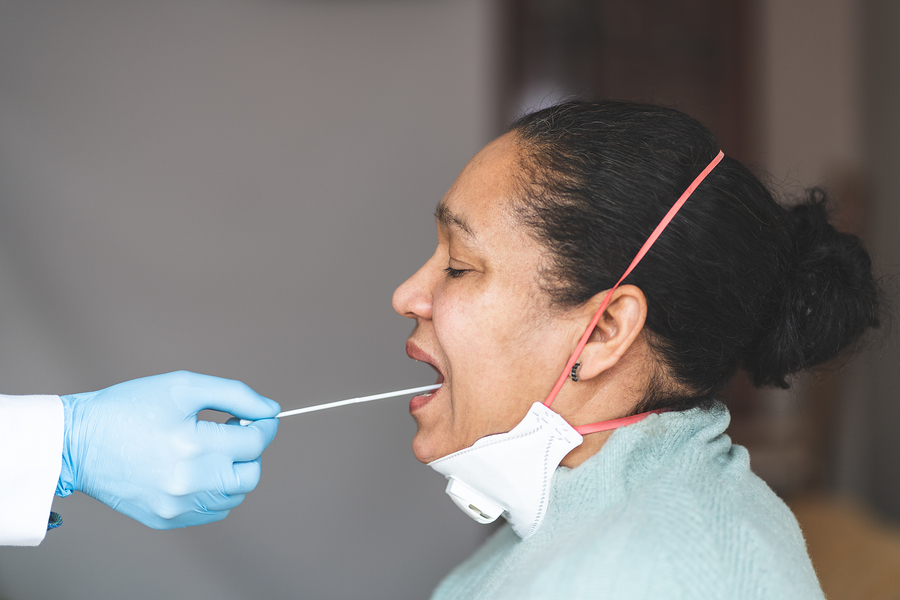Have you heard the new statistics that make the connection between severity of COVID-19 symptoms and obesity?
I was just talking a few weeks ago about how weight impacts the immune system and risk of infection. This current research makes it clear that there’s a real correlation between being overweight and your body’s ability to fight off disease.
Researchers have analyzed COVID-19 statistics and are confirming that many patients who have required hospitalization due to COVID-19 are in a specific high-risk category: their BMI indicates that they are overweight or obese.
That’s not surprising to me, since I know how many other health conditions can be associated with being overweight. The strain on the immune system means your body just can’t protect itself the way it should. So it only makes sense that high BMI would be a factor in severity of COVID-19 symptoms.
Let’s take a quick look at some of the statistics.
The Connection Between BMI and COVID-19
More than one recent analysis has come up with important statistics about obesity and increased risk of severe symptoms if you contract COVID-19.
In ScienceNews it was reported that the April 17 Morbidity and Mortality report from the Centers for Disease Control, DC revealed that among 180 patients hospitalized between March 1 and March 30, the most prevalent underlying condition for adults aged 18 to 49 was obesity. Fifty-nine percent of the 39 patients in that age range were obese. That same report showed that across all age groups, 48% were obese.
In an April 9th report in Clinical Infectious Diseases, researchers tracked 3,615 patients who tested positive for SARS-CoV-2 at a New York City Hospital. 1,370 of those patients were obese. The researchers found that patients under 60 with a BMI greater than 35 were at least twice as likely to be admitted to the ICU than patients with healthy BMIs, and three times more likely to die from the disease than those whose BMI was lower.
Research from a hospital in France is consistent with the idea that the disease presents more severely when patients have higher BMI. Of 85 patients who required intubation, almost 90% had a BMI over 35. A BMI of 30 is considered obese.
One reason this may be the case is because COVID-19 is primarily an inflammatory disease, and people with high BMI often tend to have inflammation.
It can become a real problem for hospitals when too many people with obesity need treatment all at the same time. Some of the reasons, according to a statement on the World Obesity Federation website, include: intubating patients with obesity is more difficult; weight limits on imaging machines make diagnostic imaging more challenging; patients are more difficult to position and transport; and patients with obesity may not do well in a prone position.
Health care systems in many countries aren’t well equipped to manage patients with obesity, as shown in a study published in Clinical Obesity.
Not only do the risks of severe symptoms increase, but the current pandemic may actually cause obesity rates to rise! That’s due to several factors: people are staying home and often that means being less active; weight loss programs that require group meetings aren’t available; surgeries are being limited; and many people are stocking up on and eating processed foods that keep longer than fresh foods to limit their trips outside the home. The longer limitations on where people can go continue, the greater the risk of increased incidence of obesity.
There are things you can do to protect your health in these trying times, and these are especially important if you fall in this high-risk category. Let’s take a quick look at how weight and the immune system are connected, then I’ll give you four quick tips to get you started.
A quick look at weight and immunity
I’ve spent a lot of time talking about how weight and the immune system were connected, and how reaching a healthy weight can boost your immune system to better protect you from infection. I’ll give you a quick summary now:
Research has shown for years that excess fat has a big impact on inflammation and immune system functioning. One study found that visceral adipose tissue (fat) and central obesity has a greater impact on the inflammatory process than total body fat.
A 2018 study talked about how fat is now considered an active endocrine organ that secretes hormones connecting the immune system and metabolism. And an animal study from 2019 showed that certain immune cells in the small intestine can slow metabolism, prompting food to be stored as fat instead of being converted to energy.
All of this helps us understand that obesity and immune function are clearly connected, and it also demonstrates that obesity is not simply due to lifestyle choices – genetics plays a part. But that doesn’t mean there’s nothing you can do!
Many states are slowly reopening, and that might have a positive impact on some of those problems we discussed at the beginning of this article. But one common recommendation seems to be this: if you are in a high-risk category, stay home as much as you can.
That means you’ll need to find ways to work around those barriers while remaining cautious and protecting yourself. I can help with that!
4 Quick Ways to Take Control of Your Weight
1. Cook at Home
One of the upsides to being at home more is that many people have discovered they finally have time to try new recipes out. I fully understand that you may not be in that position. Some women are working full time in essential jobs, then coming home to help children with schooling, clean the house and catch up on dishes and laundry. If that’s your situation, there are some time saving solutions available that still allow you to use fresh, whole ingredients instead of picking up fast food or throwing a frozen pizza in the oven. Try using a slow cooker, air fryer or instant pot, or search for “easy one skillet meals” online. It can also help to buy a bunch of fresh veggies, prep them on the weekends, and freeze them for later use.
I have a friend who recently decided she needed to change her stay-at-home eating habits. She loaded up on fresh vegetables, eggs, lean meats, and nuts, and did an online search for recipes that took 30 minutes or less to prepare. She told me last week that her meals have been full of flavor recently, and d she can’t believe how much better cooking with fresh ingredients makes her feel. And that’s after just one week!
2. Protect Quality Sleep
Sleep impacts weight loss more than most people realize. A tired brain is much more likely to bow to poor decision making and give in to impulses. Food cravings that you have completely under control when you’re well rested might just tempt you a little too much if you’re sleep deprived.
Sleep is also when your body repairs damage, so lack of sleep can really weaken your immune system. And healthy immune function makes weight loss easier, so it’s important to do everything you can to keep that system working properly.
I know that sleep can be tough right now – so many people are anxious and it’s impacting their ability to get to sleep, or stay asleep, at night.
3. Don’t Forget to Move
Gentle exercise is one important piece of the weight loss puzzle. Working from home may mean you’re sitting a lot more than you used to, and if you don’t remember to get up and get moving every now and then, it may impact more than just weight. Inactivity can be a factor in cardiovascular disease, diabetes, arthritis and osteoporosis, as well as weakening muscles and causing joint pain.
Some people have stopped working out entirely, because of overwhelm or factors outside their control, like gym closures and cancelled fitness classes. But even just a few days off can cause you to feel more pain when you do work out, so it’s best to keep moving.
It may seem contradictory that movement can decreasepain, but it actually makes sense. When you sit too long, muscles can become stiff and movement feels harder. But some gentle stretching, a brief walk, or even just standing up and marching in place for a few minutes can make a big difference!
4. Take Care of Your Own Emotional Health
Emotional health and food cravings are so connected. Food is often used as comfort when it doesn’t seem like there’s anywhere else to turn. But sweets are a very temporary fix, and I promise you there are better ways to feel good again.
A hobby that brings you joy can be just what you need. It may be something creative, like painting or writing; something active, like walking on the beach or dancing in your living room; or something productive, like gardening, knitting, building furniture or DIY projects around the house. Whatever it is, if you love doing it, it’s certain to lift your spirits.
If you find something that gets you outside, all the better. Sunshine (and the vitamin D your body produces with sun exposure) is important to mood, and there’s research that shows that connecting with nature is so beneficial to mental health.
And if you’re doing something fun, you won’t be bored – which means you are far less likely to overeat.
These are just a few things you can do to harness your personal power and positively impact your weight. There’s no time like the present to take any steps you can to improve your health and protect yourself at the same time!
Reviewed by Dr. Mark Menolascino, MD
Need Extra Weight Loss Support? I Can Help! Call 1-207-846-6163
If you want to lose weight quickly and don’t know where to start, I have the perfect program for you. My Slim by Choice program is a comprehensive weight loss approach, designed to help you lose weight quickly and build healthy habits for a lifetime.
My Slim by Choice online program includes the following:
- Weekly videos
- Comprehensive guides
- Simple yet effective exercises
- Practical online resources
- Exclusive homeopathic drops that prompt quick weight loss without cravings or hunger
- A personalized meal plan for the six-week program,
- A Private Facebook group community where you can share your struggles and triumphs
- And personal consultation calls from me and my health coaches.
Losing weight is tough in the best of times, never mind in the midst of a global pandemic. But there are enough good reasons – including reducing risk of developing severe symptoms if you contract SARS-CoV-2 – to make the hard work worth it.
If you’re ready and willing to make a change, don’t hesitate. Call my office now at 1-207-846-6163.








